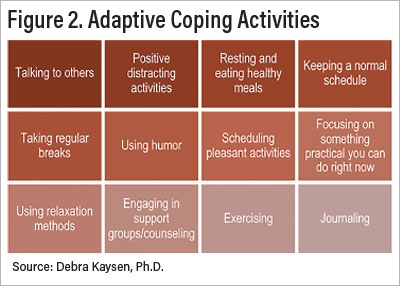Psychological First Aid in Time of COVID-19
Abstract
Experts share advice on how you can cope effectively with the trauma and uncertainty associated with the COVID-19 pandemic and help others to do likewise.

The COVID-19 pandemic is affecting all of us in different ways. Many are feeling anxious about potential risks to themselves or to loved ones. Others are feeling anxious because of the constant flow of—and often conflicting—information. Some are overwhelmed by caregiving demands, feelings of social isolation, economic impacts, and worries about an uncertain professional future. COVID-19 is affecting some people as a traumatic event, either because of the direct and severe effects of the illness itself, because of the deaths of loved ones, or because of professional duties that require impossible decisions in difficult situations. It is important to note that most individuals who are exposed to stressors or traumatic events are resilient. Nevertheless, now more than ever, mental health professionals and others in caregiving roles need support, tools, and resources to help bolster their natural resilience.
During this extraordinary time, it can be useful to tap into resources known to help individuals deal with acute traumatic events. The principles of Psychological First Aid (PFA) can help you respond to others in a constructive and supportive way and take care of yourself during this sustained and stressful time.
What Is Psychological First Aid?

PFA was developed by the National Child Traumatic Stress Network and the National Center for Post-Traumatic Stress Disorder to manualize practices from disaster mental health and provide the mental health field with a framework within which to respond following acute trauma. This modular approach was designed to support individuals in the first few days after a traumatic event. The approach is informed by up-to-date evidence regarding risk and resilience following trauma, with an emphasis on a framework that is culturally informed, applicable across the lifespan, and deliverable in field settings. PFA was adapted by the World Health Organization during the Sierra Leone Ebola outbreak as an intervention to mitigate the mental health effects of the epidemic.
At its core, PFA is a humane response that provides support to individuals who are suffering. One of the first principles of PFA is the recognition that a wide range of reactions is normal. Even though initial responses can seem overwhelming, most people who are exposed to potentially traumatic experiences do not develop long-term problems. The core actions of PFA listed in Figure 1 are designed to increase a sense of safety, connection, calmness, and hope during distressing times.
When communicating with others in distress, you can incorporate PFA constructs by focusing on the following:
Communicating with calmness to convey safety and respect.
Listening with compassion to what an individual wants to share.
Respecting and incorporating cultural customs or rituals.
Providing accurate information.
Assisting with access to individualized resources.
Revisiting coping strategies that have helped in the past.
What Is Healthy Coping During COVID-19?

The uncertain timeline of the COVID-19 pandemic raises unique questions about how to best sustain healthy coping. Unlike many traumatic events that last minutes, hours, or several days, this stressor is lasting for many months and the extended period can cause irritability and exhaustion. Physical isolation from loved ones makes gaining social support particularly challenging. Even our normal grief processes are interrupted, and feasible alternative rituals must be identified. In addition, unlike past epidemics, where the effects have been more localized, this pandemic is affecting people overwhelmingly and on a vast scale, depleting support networks and creating tremendous economic stresses.
During this unprecedented global event, extra attention to the human health basics is critical. Healthy coping may include consistent sleep, nutritious food, regular exercise, social connection (even if remote), and self-talk that focuses on compassion. Many people also benefit from extra help managing negative emotions. In both yourself and those you care about, watch out for the tendency to disrupt a regular schedule that was working, withdraw from interactions, or become overly critical of yourself or others. If there is a need for change, make a plan to address something controllable by listing possible solutions and picking the best one.

Figure 2 lists adaptive coping activities that many people may find useful. It can be particularly helpful to start with coping strategies that have worked in the past because we are all more likely to implement an old successful behavior than to start something new. In addition, these small wins help build a feeling of self-efficacy. If necessary, modify or adapt the old coping strategy to fit into current public health constraints. For example, talk with a friend by phone or video call or adjust your exercise routine in a manner that allows you to wear a mask or practice physical distancing.
A tool you might find useful is the COVID Coach mobile app. The COVID Coach app was created for everyone to support self-care and overall mental health during the pandemic.
Key Takeaway
In sum, it is important to recognize that resilience is not extraordinary; it is the norm. Resilience is also not a trait, but rather can be learned by everyone. Most importantly, resilience is not the absence of distress. Instead, resilience is the ability to manage the distress without breaking. Although the events associated with the COVID-19 pandemic can seem overwhelming, short-term coping skills such as focusing on our physical and emotional health, getting social support, and engaging in the activities we find to be affirming of our values are proven ways to actively build resilience. ■
The COVID Coach app can be downloaded from here.
An abstract of “Innovations in Disaster Mental Health: Psychological First Aid” is posted here.
“Facilitation Manual: Psychological First Aid During Ebola Virus Disease Outbreaks” is posted here.
Psychological First Aid (PFA) Field Operations Guide: 2nd Edition by M. Brymer et al. can be accessed here.



